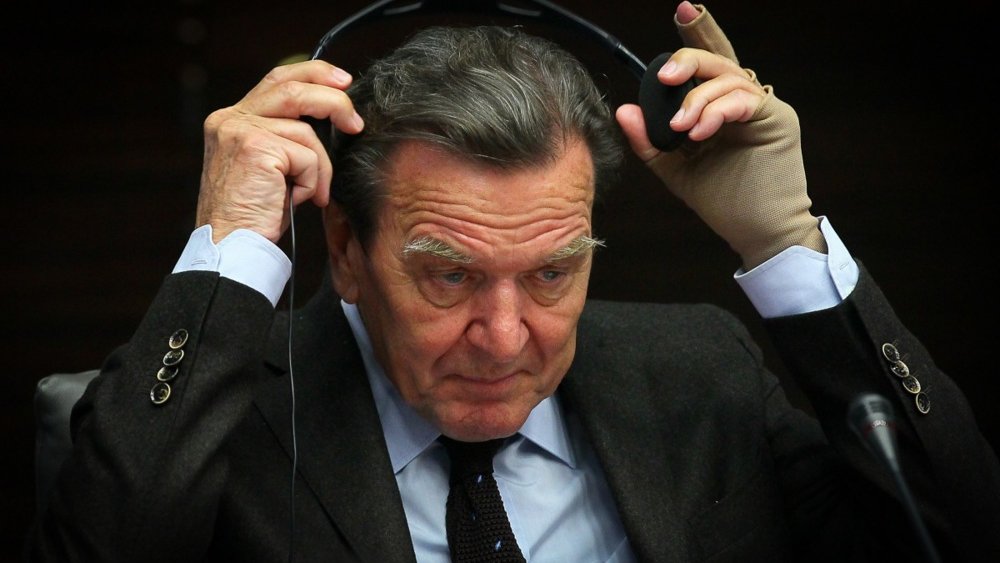Germany's former chancellor Gerhard Schröder has undergone a spectacular fall from grace in the year and a half since the Russian invasion of Ukraine. While his lucrative second career on the boards of some of Russia's biggest energy companies has long provoked frustration in his homeland, Schröder's refusal to condemn his friend Vladimir Putin's war of aggression in Ukraine saw that swiftly replaced by outrage.
Novaya-Europe looks at the evolution of Schröder's relationship with Putin, how the former chancellor became synonymous with Germany's disastrous decision to rely on Russian energy in the 1990s, and asks whether Berlin's Zeitenwende will indeed herald a new era in East-West relations.
Leading landmark reforms to Germany’s economy and overseeing the introduction of the euro, Gerhard Schröder served as German chancellor from 1998 to 2005, during which time he forged a controversial friendship with Russian President Vladimir Putin.
Today, Schröder is better known as one of the Kremlin’s most high-profile international apologists, having repeatedly refused to condemn Moscow’s invasion of Ukraine — sparking anger in Berlin and beyond.
The entire staff of Schröder’s taxpayer-funded office at the German Parliament, the Bundestag, quit in protest at his stance on the war in March 2022. Companies such as Swiss media firm Ringier and German machinery company Herrenknecht AG both rushed to sever ties with the former chancellor, while Schröder’s beloved football team, Borussia Dortmund, revoked his honorary membership.
In May 2023, German lawmakers agreed to strip the politician of many of the perks he received as a former chancellor, a move that prompted Schröder to sue the German parliament. Even Schröder’s own political party, the Social Democrats (SPD), tried to expel the former chancellor from its ranks, albeit unsuccessfully.
Through it all, Schröder has remained unrepentant, spending the months after Moscow’s invasion resisting calls to quit his high-profile posts at Russia’s state energy companies, only to resign from the board of oil company Rosneft in May 2022.
Two months later, he travelled to Moscow, apparently to try and negotiate an end to the invasion with Putin himself. Despite returning empty-handed, he insisted his visit had been necessary. “How would it help anyone if I were to distance myself from Vladimir Putin? Maybe I can be of some use,” he said in a five-hour interview with Stern magazine and German broadcaster RTL in the weeks after his return. “Why should I apologise?”
Gerhard Schröder first forged ties with Putin in 2000, when the latter was first elected president of Russia. At the time, the relationship was seen as pragmatic, a logical extension of former chancellor Helmut Kohl’s close cooperation with Mikhail Gorbachev and Boris Yeltsin.
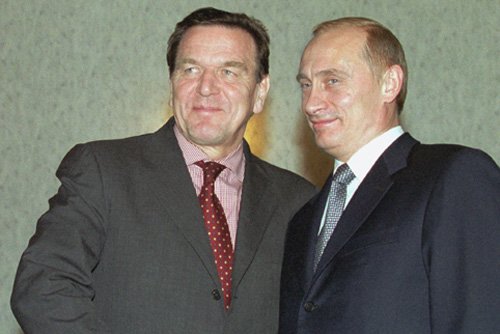
Gerhard Schröder and Vladimir Putin, 2001. Photo: Kremlin.ru
Beyond the political sphere, both men had similar upbringings and had tied their political brands to their own rugged, masculine image — a certain amount of camaraderie was to be expected, and even encouraged, for the sake of improving European relations.
But two decades later, Russia’s invasion of Ukraine has cast that relationship in a new, far less forgiving light,
with journalists Reinhard Bingener and Markus Wehner even suggesting that Putin has all but “recruited” Schröder to his cause, much as he would have during his KGB days in Dresden.
In his interview with Stern and RTL, Schröder repeated Kremlin talking points linking Russia’s invasion of Ukraine to a perceived NATO threat. In a later interview with The New York Times, he defended Putin while discussing the mass murder of civilians in the Ukrainian town of Bucha, insisting that such orders could not have come from Putin himself, despite the fact that just a month after the massacre Putin personally awarded medals to the brigade accused of committing war crimes in the town.
Such statements have seen Schröder become an establishment outcast.
But the politician has also become synonymous with Germany’s misguided Russia policy that allowed Europe’s biggest economy to become dependent on Russian gas — all while turning a blind eye to the increasing brutality of the Kremlin regime.
Comrades-in-arms
Gerhard Schröder was born on 7 April 1944 in the West German town of Blomberg, just over a year before the collapse of the Third Reich. His father had been killed in action just six months after his birth, leaving Schröder’s mother to raise her children alone.
Money was tight, but Schröder was ambitious: he worked during the day, then attended night school in a bid to pass his university entrance exams. He eventually entered the University of Göttingen in West Germany in 1966, opting to study law.
By this time, Schröder had already joined the Social Democratic Party. He was active in the organisation’s youth wing, and by the 1980s, was steadily rising through the party ranks: first as a member of the German Bundestag, or federal parliament, then as leader of the opposition and prime minister of the Lower Saxony region. Ironically for a man who would later become known as “the bosses’ comrade” for his focus on keeping business owners happy, Schröder’s politics initially skewed towards Marxism and the radical left.
With age, however, his stance softened, and by the time Schröder was named chancellor in 1998 and became the head of an SPD-Green coalition, the Social Democrats were positioning themselves as the middle ground in Germany’s political system.
The new chancellor was young and dynamic, something the German public welcomed after 16 years under Helmut Kohl, says journalist Reinhard Bingener.
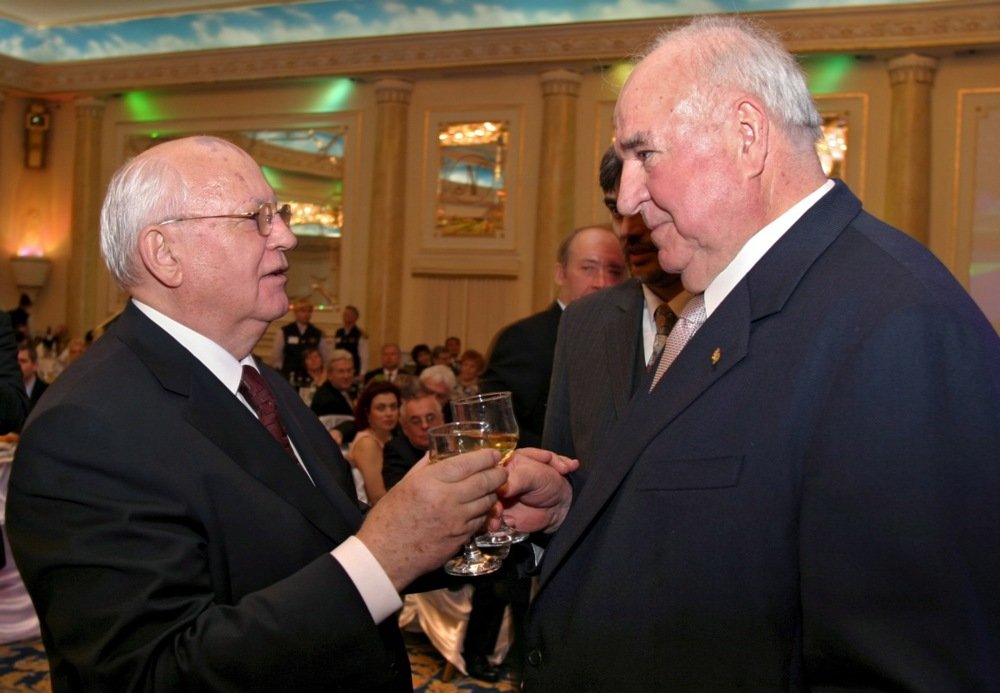
Helmut Kohl (R) and Mikhail Gorbachev (L). Photo: EPA/STRINGER
His book The Moscow Connection, co-authored with fellow journalist Markus Wehner, traces Germany’s tangled business and political relationship with post-Soviet Russia, which they describe as “the biggest mistake in German foreign policy in the country’s post-war history”.
“[Schröder] was masculine, younger, more athletic, and a more hedonistic politician in comparison to Kohl,” says Bingener. “He was quite popular, especially among women.”
While he may have been a breath of fresh air, that didn’t mean he didn’t seek to capitalise on his predecessor’s legacy.
After his election, Schröder said he would pull back from Helmut Kohl’s cosy relationship with Russia’s Boris Yeltsin. But this resolve quickly faded, and the German public didn’t see those close ties as a negative: in fact, many associated them with the relief of reunification.
“The German people associated this kind of good relationship [between Schröder and Putin] with Helmut Kohl and Mikhail Gorbachev,” says Daniel Siemens, Professor of European History at Newcastle University.
“That was how Schröder was selling it to the German audiences — that he would basically follow these kinds of policies, reinforced by male friendship between two strong leaders.”
Repackaging the Kohl-Gorbachev relationship for the 21st century with the newly-elected Vladimir Putin seemed to be an obvious move, as it appealed to the many Germans who were still firm believers in Ostpolitik: a series of policies initiated by West German Chancellor Willy Brandt in 1969 to normalise relations with the Soviet Union and its satellites.
There were economic benefits to Ostpolitik too: it laid the groundwork for the Soviet Union to start exporting gas to Germany in 1973. But, according to Siemens, there was a greater focus during that era on German security. Trade was prized not only because it provided Germany with resources, but also because countries with mutual economic interests were believed to be less likely to go to war with one another.
“I was born in 1975. I remember as a child, there was this firm belief that if things went wrong [in the Cold War] — if there was going to be a military confrontation between the two blocs — it would happen on German soil,” says Siemens. “Germans had a very strong self-interest to prevent that.”
It could be argued that Schröder continued that legacy. The German chancellor and President Putin drank beer and celebrated birthdays together; Putin even helped Schröder to adopt two children from Russia. These were seemingly not the actions of men about to go to war.
But as the Cold War ended and the Soviet Union collapsed, the security element of Ostpolitik became less important — leaving instead a focus on trade. It was a trend that would deeply benefit Schröder.
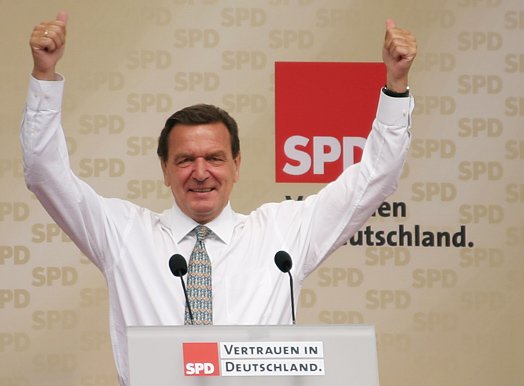
Photo: André Zahn
In the pipeline
Russian gas first started to flow to Germany in 1973 and soon proved its worth as world oil production continued to tumble throughout the 1970s, causing prices to surge.
By 1989, a third of West Germany’s gas was imported from the Soviet Union. By 2022, just before Russia invaded Ukraine, that number had climbed to 55% — earning Russia some 200 million euros in energy receipts each day.
Schröder played no small part in engineering this trend. Even though negotiations over the construction of the first Nord Stream pipeline, carrying gas directly from Russia to Germany under the North Sea, began in 1997, before the ex-chancellor came to power, it was Schröder who guided the agreement through the German government and signed it in 2005.
More controversially, it was also
Schröder who accepted a position at the head of Nord Stream’s shareholder committee — a company that is majority-owned by Russian state energy giant Gazprom — just weeks after leaving office the same year.
His appointment to Nord Stream began a string of posts with state-linked Russian energy firms.
In 2017, Schröder became chairman of the supervisory board of Russian state energy company Rosneft. He eventually left the post three months after Moscow invaded Ukraine, amid growing pressure for him to do so both in Germany and elsewhere.
Even as his image suffered in the eyes of the German public, public documents show that Schröder was paid hundreds of thousands of dollars for this work.
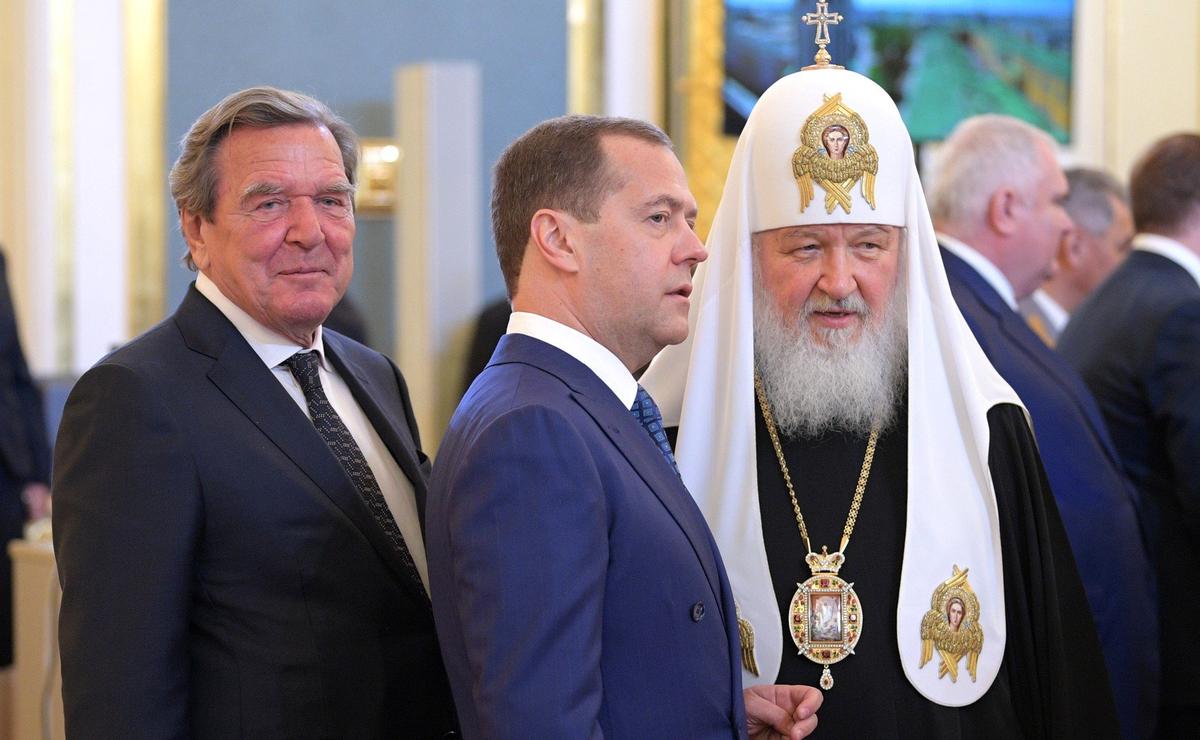
Inauguration of Vladimir Putin, 2018. Gerhard Schröder, Dmitri Medvedev and Patriarch Kyrill Photo: Kremlin.ru
“The general feeling is that as a former Chancellor, you just shouldn’t do these things,” says Siemens. He points out that the German state paid Schröder not only a pension that allowed him to be financially independent but also provided him with an office, staff, and security.
“In some ways, Schröder behaves more like a private citizen who is running a business rather than an elder statesman. In his case, the business was the Federal Republic of Germany. It’s very scandalous behaviour. In any case, it has no style.”
It appears to be more than just a question of accepted protocol, however. Journalist Reinhard Bingener says that Schröder has a far more complex relationship with Russian businesses than many realise.
“As prime minister of Lower Saxony, Schröder directed the local government to buy Salzgitter AG, a local steel factory that had made pipes for decades”, he says. “The first pipes carrying Russian gas to Germany in the 1970s came partly from this factory. It built pipes for Nord Stream, and was planned to supply pipes for the project South Stream”.
Those relationships with Russian business would often benefit businesspeople close to Schröder, says Bingener. “One of his close friends, Günter Papenburg, has a construction business that is very active in former Soviet regions and he is now the biggest private owner of Salzgitter AG. There’s all this business, and it’s all really directed into a closed circle of rich friends”.
A lasting legacy
Today, Schröder is remembered as the German politician who was willing to overlook the Kremlin’s brutality to enjoy the benefits — financial and otherwise — of Russian gas.
But the difficult truth is that he was not the only one.
While some critical voices in the German government warned that Putin was establishing himself as a dictator, they never gained real traction until 2022, says Siemens.
“The dominating German perspective was for decades that whatever could be said about the Russians, they were reliable trade partners. From the point of view of the German economy, it’s not about democracy in the Russian Federation in the first place. It’s more about whether they will honour their contracts, and whether we’ll have access to their markets.”
Indeed, Bingener takes issue with the idea that Russia was ever a reliable business partner. Even in the early 1990s, the West German government had to intervene to secure East Germany’s gas supply because Gazprom was threatening to stop it, he says.
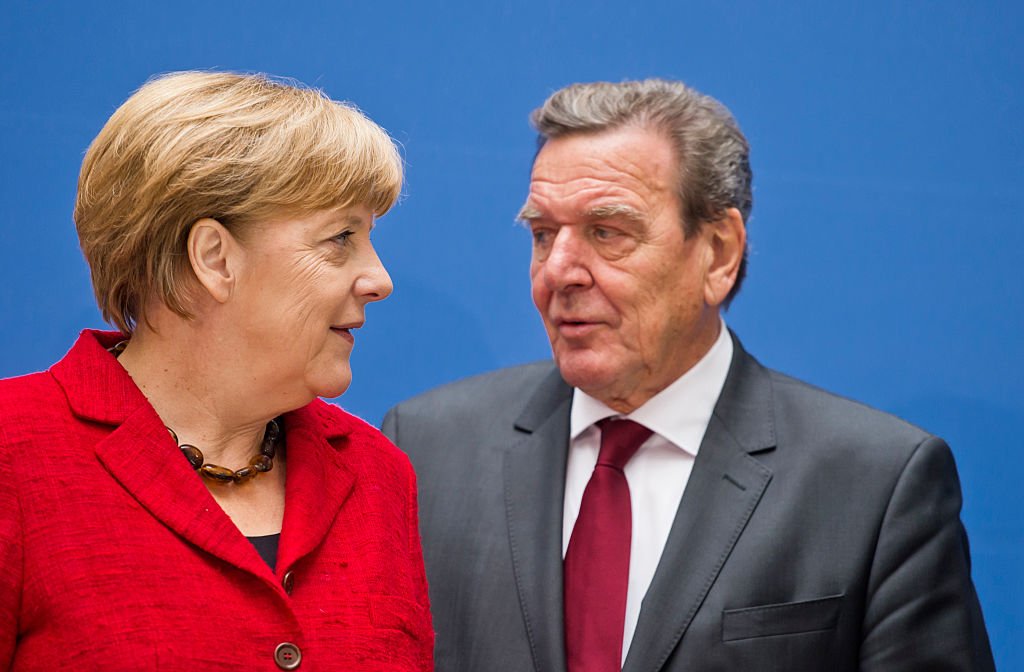
Angela Merkel and Gerhard Schröder. Photo: Michael Gottschalk/Photothek via Getty Images
Instead, he sees a generation of politicians willing to look the other way and not ask difficult questions: happy to see German industry flourish with access to cheap Russian gas, and happy to improve their own chances of re-election.
“You might suppose that Schröder’s influence ends after leaving office. But the SPD stayed as a partner of Angela Merkel’s government, and Schröder still heavily influenced the SPD,” he says.
Bingener believes that Schröder’s influence can be most clearly seen in the actions of Frank-Walter Steinmeier, now Germany’s president, but then the former chancellor’s closest aide whom he appointed German foreign minister in 2005.
“The most important part of Steinmeier’s job was Russian policy. And Angela Merkel allowed the foreign minister to formulate that policy, more or less.
She didn’t engage that much in the earlier years,” he says. “It was a kind of strategy to stay in power for Merkel. If I don’t have a conflict with the Social Democrats, I win the next election.”
But as Berlin allowed itself to tolerate Russia’s aggression at home and abroad, it also allowed itself a degree of naivety as to how Moscow could ultimately hurt Germany itself.
In June 2022, Russia cut Nord Stream gas deliveries to Germany to just 40% of capacity; in July 2022, that was cut again to just 20%.
The cuts threatened both German industry and millions of German families in the run-up to winter.
While officially Gazprom linked the decision to reduce its gas exports to Germany to ongoing repair work and issues caused by Western sanctions, the European Union accused Russia of “energy blackmail”.
The incident begged the question: why had Germany allowed itself to become so dependent on Russian energy, seemingly unaware that this resource could be weaponized?
Some of this wilful naivety can be attributed to Germany’s difficult history. In particular, the suffering experienced at its hands by the Soviet Union during the Second World War in which some 27 million Soviets died, including approximately 3 million Soviet POWs who perished in German camps, which inevitably left Germans with collective guilt that still influences how Berlin sees Moscow, says Siemens.
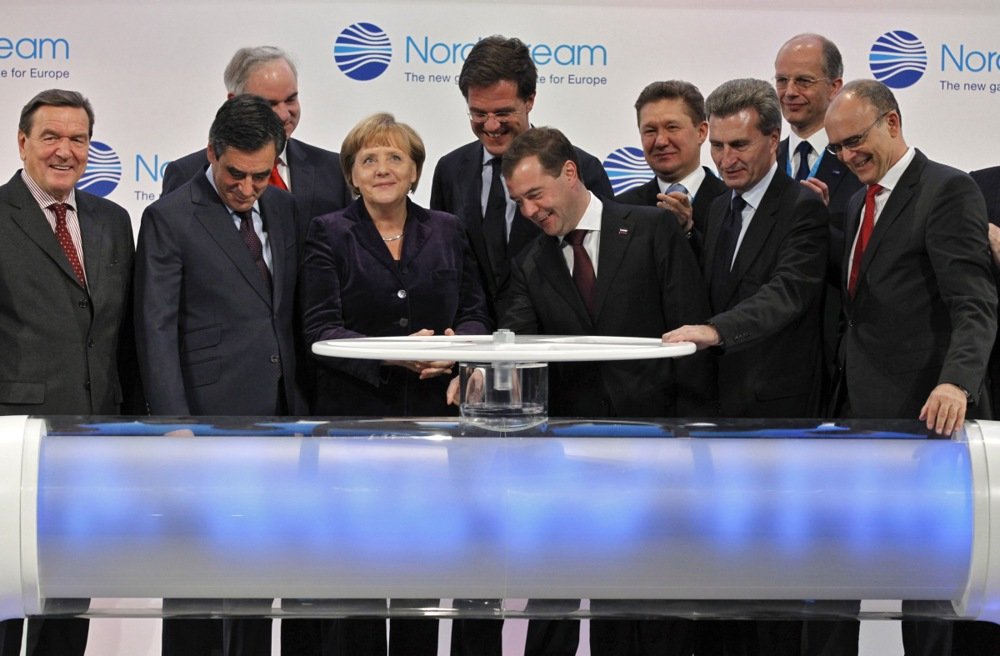
Gerhard Schröder (front L) Francois Fillon (front 2-L), Angela Merkel (front 3-L), Mark Rutte (back 2-L) and Dmitry Medvedev (front 4-L) pose during a ceremony of launching the Nord Stream gas pipeline. Photo: EPA/DMITRY ASTAKHOV/RIA NOVOSTI/KREMLIN POOL
The turbulent 20th century created a Germany that craved stability — and many German politicians assumed that their foreign counterparts hoped for the same thing.
“For the overwhelming majority of the German population, the most important lesson from the Second World War is that there should never be a war again. Germans are willing to pay a very high price if there is no military escalation, and many will look the other way to preserve even a shallow peace”, he says.
But some of Berlin’s naivety can be seen through a darker lens: a misplaced belief in German exceptionalism.
“What I see as a pattern is that the nations and ethnic groups which live in between Germany and Russia and their security needs have until very recently been seen as comparatively unimportant,” says Siemens.
“Poland, for example, has repeatedly tried to alert its neighbours to the fact that Russia might be dangerous. And this has always been dismissed by Germany as scaremongering. I think there was a long-term, somewhat naive belief that whatever happened, the Russians would see Germany as a vital ally, just as the Germans see Russia.”
A U-Turn
On 27 February 2022, three days after Russia launched its full-scale invasion of Ukraine, Chancellor Olaf Scholz stood before the German parliament and announced a Zeitenwende — a turning point — in Germany’s relationship with Russia and Ukraine.
“With the attack on Ukraine, Russian President Putin has started a war of aggression in cold blood. For one reason alone: the freedom of the Ukrainian people calls his own oppressive regime into question,” he said.
“The issue at the heart of this is whether power is allowed to prevail over the law. Whether we permit Putin to turn back the clock to the 19th century and the age of the great powers. Or whether we have it in us to keep warmongers like Putin in check.”
Although in the months following the speech many criticised Germany’s reluctance to properly arm Ukraine, the speech itself undoubtedly marked the end of an era.
For his part, Gerhard Schröder remains an uncomfortable reminder of what came before. Why he, unlike the rest of the German establishment, has yet to change his stance on Putin and Russia remains more of a mystery.
“The more I know and the more I’ve learned about Schröder, it’s really an enigma,” says journalist Reinhard Bingener. “What is driving him? There are several explanations, but I don’t want to merely speculate. But I would say he sticks to his former worldview.”
Professor Siemens agrees that there is no clear explanation for Schröder’s actions.
“Probably he thinks that public opinion in Germany has shifted to anti-Russia rhetoric to a degree that is harmful to Germany’s interests, and he’s trying to counterbalance that.
Ultimately, Schröder might say that there is just no alternative to having a working relationship with Russia, and therefore, ideally, it should be a good relationship.”
Similarly, there is little clarity as to Schröder’s relationship with Putin.
In the very best of circumstances, Putin and Schröder could share a real friendship as people who have done business and politics together for many years, says Siemens.
“But still, there must be a point where you basically have to tell your ‘friend’ that what they’re doing is not okay,” he muses. “How do Putin and the armed forces of the Russian Federation behave? They’ve killed civilians in large numbers. War crimes are on record. And still, I can’t see a level of violence where red lights start appearing for Schröder.”
For now, it is unlikely that Schröder will disappear from view. His opinions still resonate with some sections of German society: those that would prefer to see Berlin’s interests take precedence over those of Germany’s European neighbours, or those whose anti-American or anti-NATO views are fertile ground for Russian propaganda.
What remains to be seen is whether the much-heralded “turning point” of Russian-German relations will endure.
“I think Germany cannot go back to a policy of coddling Russia with tender kisses left and right,” says Siemens, adding that the war in Ukraine had also demonstrated to the Germans that they are less important and more vulnerable than they previously assumed. “In the long term, what we will probably see is that relations with Russia will improve again, but even then, Germans will not go back to the naive understanding of before.”
Join us in rebuilding Novaya Gazeta Europe
The Russian government has banned independent media. We were forced to leave our country in order to keep doing our job, telling our readers about what is going on Russia, Ukraine and Europe.
We will continue fighting against warfare and dictatorship. We believe that freedom of speech is the most efficient antidote against tyranny. Support us financially to help us fight for peace and freedom.
By clicking the Support button, you agree to the processing of your personal data.
To cancel a regular donation, please write to [email protected]
